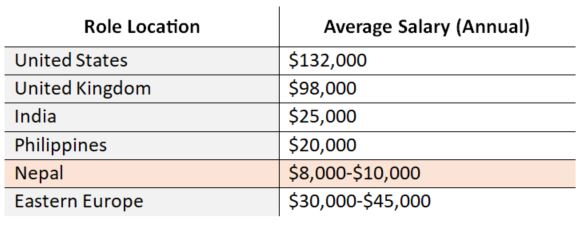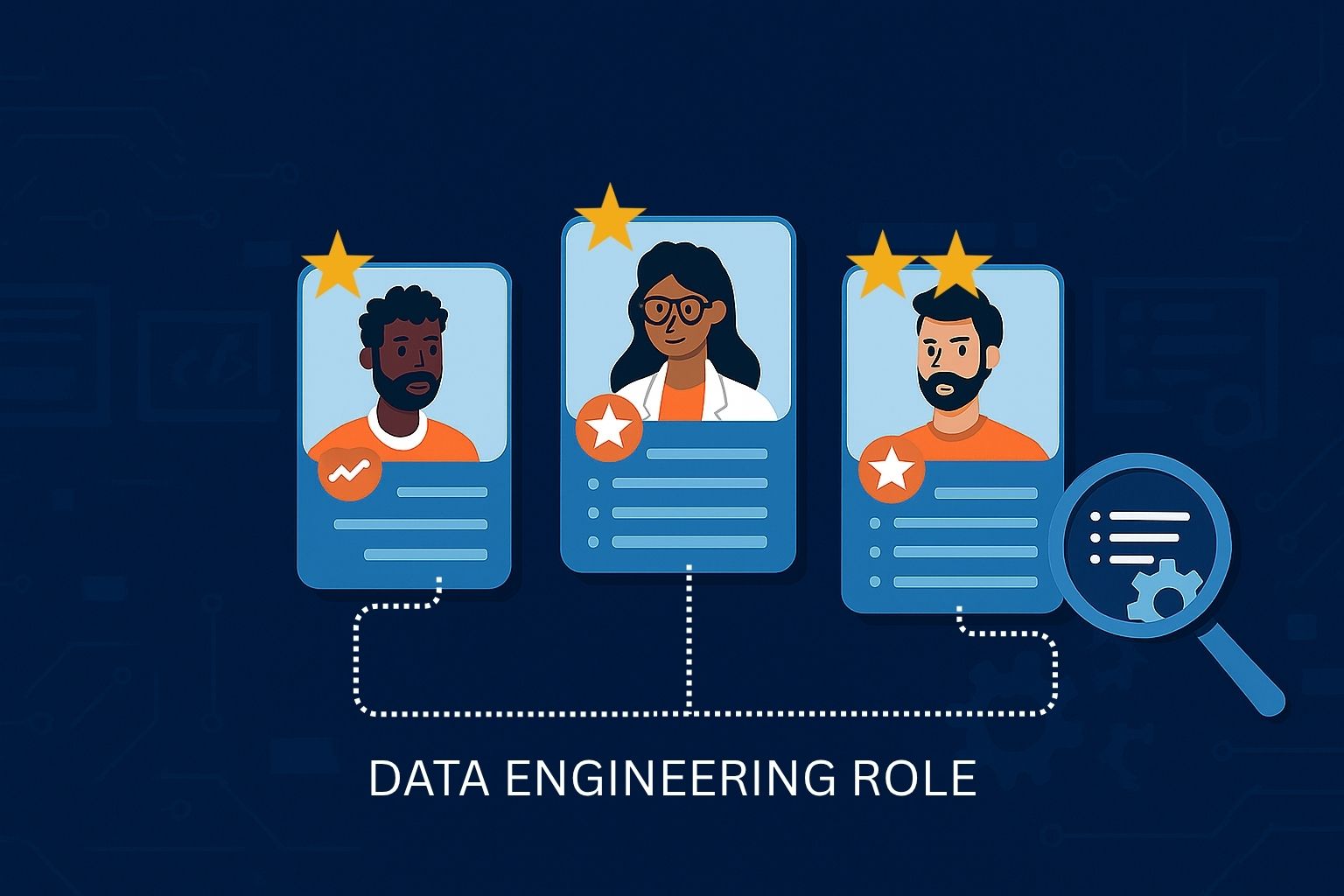Aagya Khatri on Jun 13, 2025
Reading Time: 7 Min
Finding skilled data engineers for your startup is both costly and often more challenging than securing funding from venture capitalists (VCs), as local talent is either too expensive or already employed by Big Tech Companies. So, what do you do?
The solution is to offshore data engineering roles, as there is an untapped global market of capable engineers willing to partner up. Startups are going international to find top talent that costs less of your budget, works remotely, remains stable in a volatile market, and scales up quickly.
Let’s explore how offshoring data engineering roles may benefit you and ways to find a reliable partner.
1. Global Talent Advantage
Startups across various industries are increasingly utilizing data engineering to make data-driven decisions, understand their customers, and gain a competitive edge. Specifically, data engineering assists startups in areas such as building scalable data pipelines, managing large datasets, and extracting valuable insights.
Today, startups are no longer limited by geography or region when it comes to hiring skilled data engineers. Remote collaboration tools, cloud-based workflows, and trusted work management and documentation tools enable managers and in-house teams to collaborate with data engineering teams located anywhere in the world.
.jpg)
By going global, startups not only widen their hiring pool but also gain strategic advantages that boost speed, quality, and innovation.
What to Look for In Hiring Data Engineers
- Look for Knowledge: Countries such as Nepal, India, Poland, and Ukraine produce over 150,000 Science, Technology, Engineering, and Mathematics (STEM) graduates every year. Many of them have hands-on experience with modern data stacks, including building data pipelines, managing cloud infrastructure (such as AWS, Azure, or Google Cloud Platform), and utilizing analytics tools like Apache Spark, Airflow, and dbt.
- Strong Communication Skills: Select a data engineering team that is fluent in English, making intra-team collaboration easier. Offshore engineers are often trained in teamwork and agile team practices, making them effective communicators in daily stand-ups, sprint planning, and asynchronous documentation.
- Time Zone Coverage: Hiring across multiple time zones means your engineering workflow does not have to stop at 5 PM. Offshore teams can handle overnight deployments, QA cycles, or batch data jobs, enabling near 24/7 productivity and faster turnaround on critical tasks.
2. Cost Efficiency Without Compromising Quality
Startups often operate with tight budgets and deadlines, where every dollar counts. Hiring an offshore data engineer can be a strategic cost advantage, but it is also an expensive investment.
Startups report cost savings of 40–70% when offshoring data engineering roles, including shorter onboarding times, improved team coordination, and minimal variations in productivity.
These savings can fund additional hires, extend operational lifelines, or be reinvested into growth.

Financial Benefits of Offshore Data Engineering Hiring
- Reduced Overhead: Offshore and remote hires eliminate the need for office space, hardware provisioning, and physical infrastructure, freeing up funds for other business purposes.
- Flexible Contracts: Many startups utilize contractor or freelance models, enabling easier compliance, lower risk, and reduced HR obligations.
- Agile Scalability: Offshore teams enable easy ramping up or scaling down based on sprint velocity, project complexity, or shifting data needs without incurring long-term financial commitments.
3. Faster Scaling with a Plug-and-Play Approach
While hiring local data engineers can take 8–12 weeks due to sourcing, interviews, and negotiations, offshore platforms like Turing, Deel, and Toptal offer pre-vetted data engineers who are ready to start within days, eliminating the need to conduct interviews and test engineers.
Offshore specialists often also come equipped with experience in modern data ecosystems, making it easy to integrate or separate them from existing workflows with minimal ramp-up time.
How to Accelerate Delivery with Offshore Teams
- Data Migration: Moving from legacy databases to modern data warehouses like Snowflake or BigQuery for storage and data migration.
- Pipeline Automation: Building scalable ETL/ELT pipelines using tools like Apache Airflow, dbt, or Prefect.
- ML Model Deployment: Helping data science teams deploy Agentic AI models using platforms like AWS SageMaker, Vertex AI, or MLflow to complete menial tasks quickly.
- Cloud Integrations: Bridging multiple SaaS platforms or managing multi-cloud environments (AWS ↔ Azure ↔ GCP) for flexibility, scalability, cost saving, and enhanced security.
4. Easier Access to Specialized Skills
Data engineering is not one-size-fits-all. For example, a marketing analytics startup often requires experts skilled in building robust ETL (Extract, Transform, and Load) pipelines to efficiently gather and process data for creating and running ads, landing pages, and social media campaigns.
On the other hand, a healthcare application must navigate strict regulatory requirements such as HIPAA or GDPR, which involve extensive validation of data at entry points, regular data cleansing, data profiling, and establishing monitoring tools.

What to Look for in Offshore Data Engineers
- ETL/ELT pipeline design: Experts proficient in modern data orchestration and transformation tools such as Apache Airflow (workflow scheduling), dbt (SQL-based transformations), and Fivetran (automated data connectors).
- Cloud data warehousing: Engineers with deep experience in platforms like Google BigQuery, Snowflake, or Amazon Redshift for scalable, high-performance storage and querying of large datasets.
- Real-time streaming data processing: Proficiency in systems such as Apache Kafka, Apache Spark Streaming, or Apache Flink to handle continuous data streams, enabling near-instant insights.
- DataOps and CI/CD pipelines: Skills in automating data pipeline deployments, version control, testing, and monitoring using tools and practices from software engineering adapted to data workflows.
- Programming and scripting: Strong command of programming languages essential for data tasks, including Python (for scripting, data manipulation, and ML integration), SQL (for querying relational databases), and Scala (commonly used with Spark).
- Business intelligence and analytics: Expertise in visualization and analytics platforms like Tableau, Power BI, or Metabase to build user-friendly dashboards and reports that drive data-driven decisions.
5. Resilience Against Local Market Volatility
Startups in regions like the U.S. and Europe face multiple challenges beyond just shortages of skilled tech talent, mostly due to prevailing economic and political policies.
Economic factors, such as high inflation rates, frequent layoffs, and funding freezes from VCs, may create an unstable environment for local hiring. Moreover, these conditions also increase the risk and cost associated with building and maintaining in-house teams.
Offshoring may help prevent such scenarios. Moreover, you can switch from one offshore destination to another in case of political or economic instability in a particular country.
How Global Distribution Strengthens Startup Resilience
- Business continuity across time zones: By distributing teams globally, startups can implement near 24/7 operational coverage. For example, when the U.S. team clocks out, engineers in Eastern Europe or Southeast Asia continue to develop and monitor. It accelerates product cycles, bug fixes, and customer support, enhancing overall agility.
- Risk diversification: Relying solely on one geographic labor market exposes startups to localized risks, such as sudden layoffs or economic downturns in that region. Offshoring spreads these risks by tapping talent pools in multiple countries with varying economic climates.
- Access to diverse innovation ecosystems: Different regions specialize in distinct technology domains. For example, Southeast Asia has emerged as a favorable destination for full-stack development and data engineering. By establishing distributed teams, startups gain expertise and technologies that might be scarce locally.
Conclusion
Startups are now not only saving costs but also unlocking talent, speeding up product cycles, and bringing operational resilience through offshoring.
In a world where data is the new energy, access to engineers who can refine it, regardless of location, is becoming the true competitive edge.
So, if you are a founder in 2025 stuck in the hiring loop, contact Searchable Design, the top remote data engineering provider, to find the right data team one time zone away.
Comments(0)
Your email address will not be published. Required fields are marked *
Recommended Posts
Unlock the Secret of Power BI to Empower Your Data Analysis
Turn Raw Data into Real-Time Intelligence with Power BI
How to Empower Your Web Development Project in 2025?
Empowering Your Web Build with the Right Strategy, Stack, and Global Talent Network
6 Tips for Selecting the Best Offshoring Team for IT Roles
Smart Scaling Starts Here: How to Choose Offshore Talent Without Compromise
RECOMMENDED TOPICS
TAGS
- offshoring
- outsourcing
- web development
- data analytics
- artificial intelligence
- offshore
- it support
- digital marketing
- project management
- agile methodology
- project management system
- data
- pms
- data centric approach
- app development
- customer insight
- it infrastructure
- it sustainability
- cloud computing
- agentic ai
- business process automation
- voice search optimization
- seo
- tiktok
- growth hack
- saas
- data engineering
- global talent pool
- techical consulting
- power bi
- business intelligence
- backoffice
- communication
- outsource
- remote team
- it roles
- web security
- data engineer
- content development
- business development
- offshore talent
- legacy software
- insurtech
- insurance
- off
- data decision
- test
About
Data Not Found
NEWSLETTER
Related Posts
How to Empower Your Web Development Project in 2025?
Empowering Your Web Build with the Right Strategy, Stack, and Global Talent Network
Benefits of Technical Consulting in Professional Marketing Strategy
Bridging Innovation and Strategy for Unstoppable Growth



